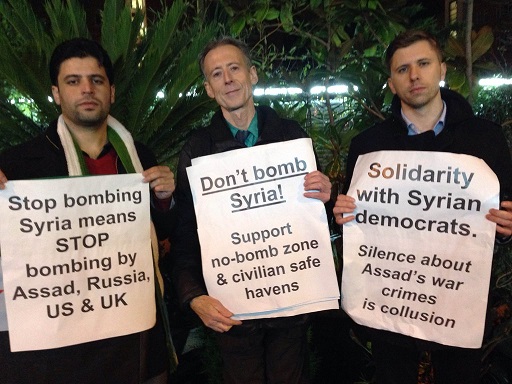British Shadow Chancellor John McDonnell recently gave an interview to Alastair Campbell for GQ magazine.
McDonnell has long been associated with the left wing of the Labour party, and has a long track record of opposing war and neoliberalism from the back benches. To his credit, he was one of the few Labour MPs with the foresight and principle to vote against bombing Libya in 2011.
Campbell, on the other hand, was Tony Blair’s press secretary, and played a key role in trying to sell the 2003 invasion of Iraq to the British public.
In 2010, The Guardian reported that:
Fresh evidence has emerged that Tony Blair’s discredited Iraqi arms dossier was “sexed up” on the instructions of Alastair Campbell, his communications chief, to fit with claims from the US administration that were known to be false.
As is now known, the invasion and occupation of Iraq was an unmitigated distaster in every respect. It failed on every conceivable grounds that you might try to justify it on.
There were no WMDs, and there was no intelligence saying Iraq presented any kind of threat to the U.K..
It made the terror threat to the U.K. worse, as the Blair government knew it would.
It lead to an increase in torture in Iraq itself, rather than a decrease, as well as ongoing and severe repression (scores of protestors have been shot dead by Iraqi security forces in the last few days alone). This torture wasn’t confined to Iraqi security forces, of course. The U.S. employed torture as well, at Abu Ghraib prison, and deliberately turned a blind eye when they saw Iraqi security forces doing it.
Far from leaving behind a democracy, the U.S. and Britain left behind a ‘budding Police state’, according to Human Rights Watch.
It also, as Barack Obama said, helped to birth ISIS.
And last but not least, 4-5 million Iraqi people were killed or displaced, often as part of gruesome masscares, such as the one at Haditha.
There can be no suggestion that the invasion and occupation of Iraq was a well intentioned endeavour that went tragically wrong. The evidence points to it being based on lies, deceit, profiteering and supreme contempt for Iraqi lives from day one.
It is my contention that by even agreeing to be interviewed by Campbell, one of the people responsible for the invasion of Iraq, McDonnell was helping to rehabilitate the reputation of and normalise someone who should not be rehabilitated and normalised. For that alone, McDonnell – who *does* know better – should be ashamed of himself.
Even more troubling than McDonnell cosying up to a propagandist for war crimes, during the course of the interview McDonnell denied that Tony Blair is a war criminal.
Personally, I would have opposed the invasion of Iraq even if it had been legal. The U.N. Security Council is not a reliable arbiter of what is and isn’t acceptable on the global stage, dominated as it is by the major international powers acting in their own, often conflicting, interests.
However, the case for the invasion of Iraq being formally illegal is a strong one. Without a second Security Council resolution authorising it, it amounted to the Crime of Aggression, something which a judge at the Nuremberg Tribunals described as ‘the supreme international crime’.
This is not a fringe anti-war position. The legal director and deputy legal director at the Foreign Office at the time of the invasion both advised it was illegal. The U.N. Secretary General at the time also said it was illegal.
Legally then, Tony Blair is a prime facie war criminal, and a very serious one to boot.
The invasion and occupation of Iraq was also a moral crime, for the reasons I have set out above (the evidence for torture, massacres and repression being carried out by the occupying authorities and their Iraqi proxies is so extensive that I’m not going to present it all here). Indeed, in 2007, Amnesty International explicity accused the Blair government of ‘trying to undermine the ban on torture at home and abroad’.
McDonnell says in the GQ interview that Tory austerity is killing his constituents. He has also said in the past the Tories might be tried for social murder. I have no wish to quibble with or dispute these positions.
But by denying Tony Blair is a war criminal – and so by extenstion, that the invasion of Iraq was a crime – McDonnell is, whether he intended to or not, devaluing the lives of millions of Iraqi civilians as compared to the lives of his constituents. He is helping to cultivate a political climate where something like Iraq might happen again.
That is the rankest social imperialism, is rooted in racism, and should have no place in any party that wants to call itself socialist, anti-capitalist and anti-imperialist.
It is now incumbant on McDonnell to clarify his remarks, or apologise.






